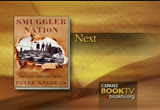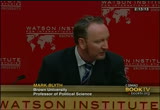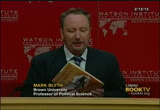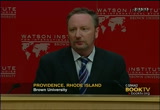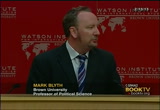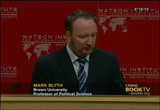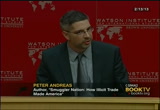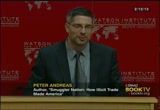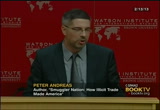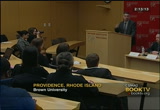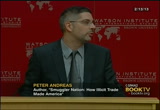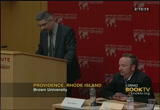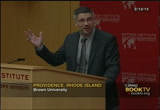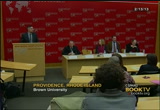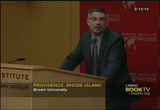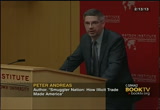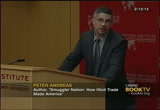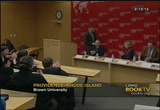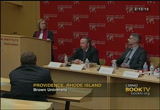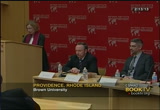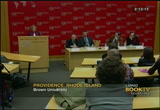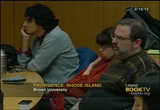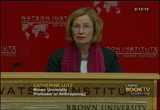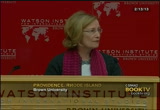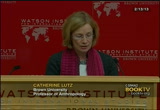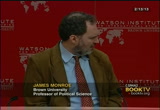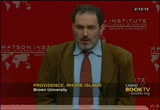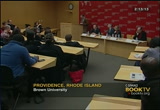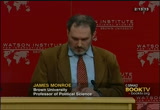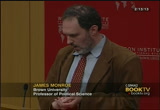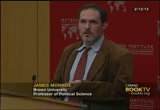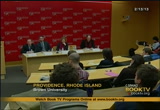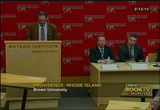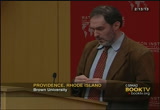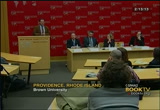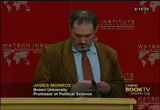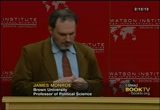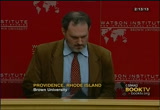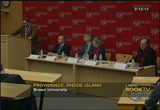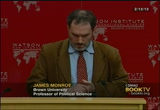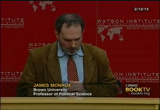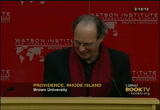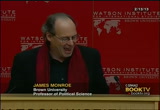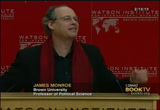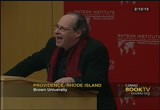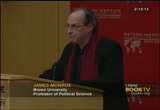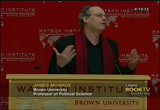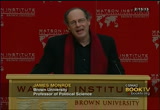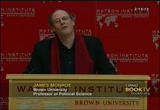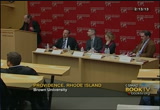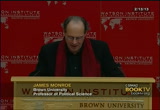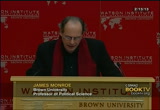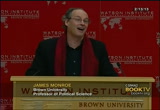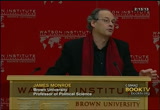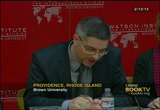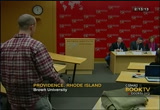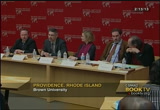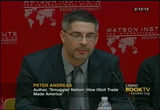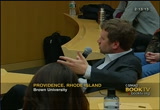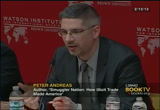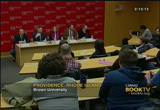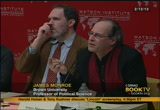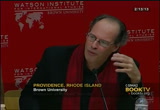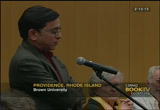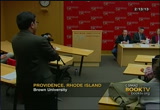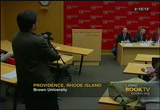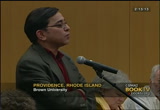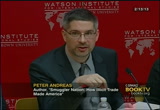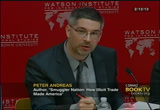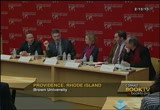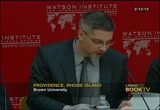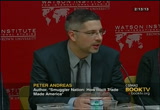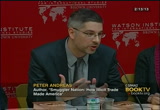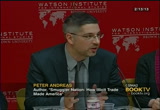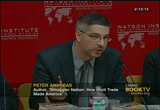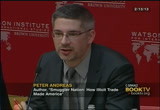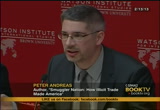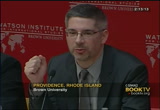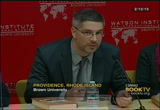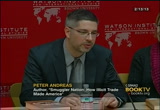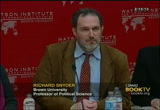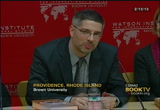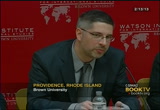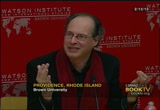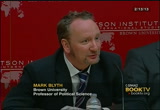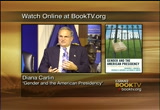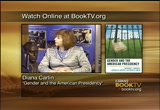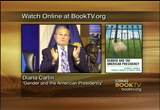tv Book TV CSPAN February 24, 2013 2:00pm-3:30pm EST
2:00 pm
>> at now, peter andreas talks about the long history of smuggling in the u.s. from which prior to the revolutionary war, was stricken by a desire to curb domestic indices and bypass import taxes to the british. it is about an hour and a half. >> at afternoon and welcome to the watson institute for international studies for the discussion a peter andreas' new book, "smuggler: how illicit trade made america." housekeeping i have to mention some things. the way we are going to run assist fathers. to do with brief introduction and then peter will talk about the book because obviously we need to say something a context than most of you have not read the book would be a one-way conversation. i will invite catherine richard and james to say their piece on the boat and hopefully we can get stuck in a good position.
2:01 pm
after that we will open up for q&a. you will see one fixed microphone there and another vocal microphone for the site of the house. if you wish to join q&a, get up and stand behind the microphone. we have to do it this way because they are so mobile is for recording c-span and we do want your questions and answers to be an integral part of this broadcast. so there we go. without further ado, i'll begin my brief introduction. so here's the book. there we go. for those of you who know peter, you know this is unusual. peter tends to write short books. you think to yourself, this is serious. i'm not going to get into the
2:02 pm
details. i'm going to see general things about the book at the first one is this book marks peter andreas thugs at because it's well-written and is actually enjoyable. it's quite readable and clear and utterly devoid of jargon and it contains a powerful political message. the second reason to like this book is that it is not devoid of theoretical hats, pretension. tijuana sociologists who passed away recently and the standard model we have a social science is or how states build is that states need more and worse mainstays. that is unique revenues to beat
2:03 pm
the living daylights out of other states, see developed these administrative capacities and how you do this determines the state you end up. ps, line 50 yeah that's right, but not quite. there's also the people who cross your borders and the people you want to keep out as well as the people you bring in. there's no monitoring, capacity building, engineering that goes on the nixie stated to a state. we are markedly blind as to how much of the state as a police authorized and how much policing has to did not just at the extraction but exclusion and how much the exclusion has to do with regulation as to who we are and who we think we are and who we pertain to be in the world. os x and want to say about the book is there's no entry in the index, but there should be
2:04 pm
because the moral outrage that is buried ever so slightly throughout the book is peter's outrage over the hypocrisy about this. the fact we've had a 100 year on drugs that produces nothing except casualties. the fact the united states was the world's biggest technology stealer to the entire 19 century didn't give a about partners and granted to people in the country who stole it. we're a nation of astonishing hypocrites i sent they need to come to grips with. it is a good way of starting conversation. the author himself to say why he wrote this book and what he hopes to achieve by doing so. hot act
2:05 pm
>> thank you, mark. so a few of my punchlines, but that's okay. i thought it would be useful to tell you a little bit about the book before people comment on the book. it would be strange if he didn't know background about it. first i will tell you briefly what the motivation was. the motivation is really that i can't think of any policy debate today in washington, which suffers from a more severe case of amnesia and discussions about order control, border policing, illicit trade trafficking of all sorts. the area have been working on for quite some time feels like you need to date not just years or decades, the centuries. this is bringing history back in if you will. the argument is really the subtitle of the book. to my great surprise, i
2:06 pm
discovered the argument was more true than at this outset, which is you can't really explain the founding of the country, the american revolution, the republic, worse a source which i'll tell you in a second. westward expansion, the slave trade, economic development, border dynamics and so on without taking into account dynamics of any sort. so put that more front and center in the story of america's retelling of the ones of smuggling is what this book does. his various pieces of this. the trade, migration and so on. but this is a 300 year sleep and it's a flawed focus my colleagues will tell you maybe, but the first of rereading the epic in its relations with the rest of the world through the lines of smuggling and illicit
2:07 pm
trade. since we are here at brown university, where teachers students and colleagues, one thing i found particularly interesting and quite traumatic and shocking is the importance of brown university in rhode island, the tiniest state in the nation in the realm of illicit trade in the very beginning. the great irony i trace in the book is that a country that corruptly smuggling, given birth recycling this today the world's leading policing superpower, the most aggressive enthusiastic anti-smuggling crusader at tivo. so it's quite a transformation. markey is the hypocrisy. it's not only not in the index. i'm not even sure the word hypocrisy appears in the text itself.
2:08 pm
amazon can get inside of the book. i haven't checked. but let me tell you in just a few minutes of my time for stories. they're 16 chapters and someone, but for stories. the relationship between illicit trade in warfare and all the stories, by the way, have contemporary relevance, lessons for today. there's much talk about the relationship between conflict commodities and war. for example, finance guerrillas in colombia or opium financed mujahedin in afghanistan. smuggling related to conflict and even blood diamonds to popularize term to describe the relationship between diamonds and conflict in west africa and elsewhere. what i do in this book is look
2:09 pm
at the experience i'm sure it's a very old story. the united states master the relationship between illicit trade in war before we tacked to conflict commodities, blood diamonds and so on. after all, how can george washington supply his troops but that massive smuggling of gunpowder since we actually had no domestic capacity. one of them is in fact john brown at brown university who sought gunpowder at exorbitant prices to george washington of course i'm insane or charging us these prices come up with no choice because of extreme circumstances. john brown emerged the richest men in rhode island because he was such a profiteer. fast forward to the war of 1812.
2:10 pm
most people to remember this war. not only important, one of the main reasons the united states failed to annex canada as it turns out we were more interested in trading of them fighting them. they were quite intertwined economically, not so enthused about fighting. the british troops in canada were greatly dependent on the smuggling to keep troops of either would've been a much more terrible shape that american forces could stop the flow. another story is the whole intellectual property theft debate, finger-pointing at china and other countries. i basically emphasize is do is they say, not as they did and from the get-go, america's mode of industrialization was not focusing first on domestic innovation, but aggressive
2:11 pm
widespread enthusiastic over past, especially british technologies. alexander hamilton was the most enthusiastic upon it, almost official state policy to go out and do this. interestingly enough, in other brown brother has a crucial role here. not john brown the bad rather come the slave trader, profiteer, but the nice brother, the quaker, pacifists, abolitionists. how did mrs. brown play a role here? he hired samuel slater. they are considered the grandfather of the american industrial revolution. probably an overstatement, but go to wikipedia and he will be credited. he actually smuggled himself out
2:12 pm
of england in defiance of extraordinarily strict british immigration laws that did not allow machine has come artisan precisely because if he did would end up helping countries other than england. smuggled himself to new york. heard about him, brought him up to start a meal in pawtucket at the street. moses had since smuggled machinery to work on to see if it might help. turn out to be useless or the campbell is the person the rest is history. in the stories about fortunes made. everyone is talking about how much pablo escobar made. he actually made the list of wealthiest people in the world. a mexican drug trafficker has
2:13 pm
joined that infamous list. you know if you're on the list your days are numbered because you're giving too much attention. if we look in our history, some of our founding family fortunes are built on illicit trade another dimension to brown brothers, and we can look to the hancock family in boston. we can look to america's first multimillionaire, john jacob astor. how did make his money? he made his money in opm smugly, trading during the war of 1812. most importantly by selling illicit alcohol to native americans in exchange for a much coveted and profitable first. the trade was banned by the federal government but clearly enforced, so the american trading come any specialized essentially and exchanging alcohol for her and he's remembered as america's wealthiest man first multimillionaire.
2:14 pm
last but not least, there's much talk in the immigration reform debate going on for years now how our borders are out of control. the languages we need to regain control. how can he regain control if you never had controlled the first place? in fact, america was built for better and worse. from the very get-go, the state building story mark alluded to at the very puffers however imperfect and failing to try to regulate border crossings of all stories does have the american statements with one of the first institutions of the american federal government at a time that was so anemic and which was the custom service. was he trying to do? and for straightlaced stop the smuggling and a newborn countryside only has to stop what he was encouraging a few
2:15 pm
years earlier. suddenly it wasn't patriotic anymore. it is heading at the core. so we look at the u.s.-mexico border, exhibit eight about a control borders to secure the border first before we can move it all forward and immigration reform. it shows a gross disregard to the ignorance of history. after all, america's borders are far more secure, far more surveilled, monitored, policed and so on, especially the u.s.-mexico border. it's an old story. as much as they focus on the border, we can look back to show the u.s. canada border play just as important if not more important in illicit trade over the decades. as i mentioned, the war of 1812
2:16 pm
and password to prohibition. today's treatments are crossing was just as much of a smuggling superhighway as far as impasto is today. back then there is a lot of finger pointing north. in fact, it was almost official to tax the tree so they could facilitate the moving of alcohol across the river, pretending they were going to cuba and signing paperwork, looking the other way. i've taken my time in a shared. i let my colleagues let me know how much they enjoyed or not the book. thank you very much. [applause] >> professor of anthropology to open a un- smugly nations
2:17 pm
>> great. this is a really wonderful book and i think it's going to be on the bestseller lists. it led me to look at the bestseller lists. the books on u.s. history to capture the american imagination are a pretty narrow bunch. they tend to be about the founding and i would tend to be reverentially capitalized. or they tend to be those soldiers that were and there properly so i did of course. and also individual u.s. president and the worse they are often removed. this week is no different. he looked at the list in the top 20 list on amazon has nine books on past u.s. military activities. snipers ncos on world war ii missions and hostage at to the rescue is. we've got the truce is history
2:18 pm
in the vietnam war, the other one the civilian senate. again, part of the sequester of nine. six spoke some presidents. thomas jefferson and three kevin steven spielberg's work on lincoln. so first of all rather than focusing individuals and their choices and values as his history often is, he investigates broader social political processes which named up individuals to move into their work. ambitiously align three centuries he takes us through these cultural and economic cortical processes that give us the very idea of a border identifies the national and international declarations to make objects, including classes of people things they should not move across borders and changes
2:19 pm
over time, for example, surprise the slave trade, racial categorization of who wesson was not a desirable person to cross over. the taxes and duties another name. he tells us about the much broader consequences smuggling. whether a certain quantity of drugs come across our borders, the federal policing in general and control smuggling. finally, the book's ambition is to put into perspective of moral panics on illicit order crossings of various types we know these pervasive images of chinese immigrant in box cars. tunnels under the u.s. border
2:20 pm
from mexico with drugs running through them. trafficked women is the latest moral panic about women who come across two truckstops and so on. so the notion on dresses giving us his prohibition itself was the original impetus to these economic strategies. the list of mr. legality of these things is the cultural and political economic phenomenon to draw attention to it shows a piece of evidence is viscountess alkaloid swings wildly through time. we see connections between panics and anxiety and the material conditions and material interests of government to la cosa nostra make a profit by managing order can be seen throughout the book. while speaking to the broadest audience of readers, you guess kay says a variety of academic work and this includes mary douglas, whose idea to focus on
2:21 pm
how humans regularly do this, regularly traffic in purity and danger, so not just a borders, but other entities, where inflows and outflows are closely and anxiously monitor. the history is consistent across social sciences over the last number of years to focus on the singularity or sameness of the fate of governments and understate ubiquity of transnational flows. his book stories illustrate what others have said about construction. andreessen norstrom both trade and politics and culture than universal codes the modern state enforces by nature. they show how we tend to think of smuggling as the exception when in fact it may be more the rule. smuggling turns out remark be marketed, not a problem state tries to solve what the root by which the state and elite in a
2:22 pm
democracy remain the home are achieving some of their own ends. this is the reason that peter spoke starts with this first but no as mark mentioned. he famously reversed the conventional wisdom about the state and war and on various -- you can see the state as a protection racket, which is the notion the state garners legitimacy by protect the people from threats that in itself is sent tens generated in the same way the smuggler is to figure the state protects its people against those who would violate orders and garners legitimacy comes even as peter is pointing out exquisitely encouraging such movements. and they think there is a gender
2:23 pm
story that is a masculine icing project in a certain way. these threats in a certain gender schema that with this file through the last three centuries. it is lively, expertly between details for smuggled rom and things as industrialization and changing the berlin station. the national history suggests we think the idea of the nation that exists because it exercises sovereignty with the stroke of a legal pad. the emerging imperial resend to create this distorted historiography. the exceptional s. idea that it
2:24 pm
is now was nonetheless deemed to have been made by god rather than founded in the complicated human politics of the struggle he so well illustrated for us. [applause] >> now have reflections by richard snyder, professor of political science. >> thank you, mark. it's wonderful to be here for a number of reasons, to celebrate my friend and colleague, peter andreas. i remember sitting with peter back to? , just up the street from us five years ago, six years ago. i don't exactly number. he shared with me a seven or eight page perspectives for what eventually became this book.
2:25 pm
and it's just a pleasure that is now here and can be shared with all of you admit a black and in the way i feel all i have to do today is to say congratulations, peter and sit back down. [laughter] i can't get away with that, you know. my role in addition to that is to push and pull and stir things up a bit, so i'll try to do my best. so smuggler nation has a history of a partly why do such a fat work. >> it's american history, so by definition it is sure. [laughter] >> well, it's partly a book of history, but this is a much more ambitious book than just a book of history, short or long.
2:26 pm
peter self-consciously tries to speak to the present committee's history to speak to the president and even to policy. this fits very nicely with the mission of the institute for international studies we are standing in today, which is to bridge the world of scholarship and practice, to bring scholars and practitioners together. so peter's retelling of american history or american political development through the prism of illicit trade in efforts to control it is an example of what we might call publicly engaged historical analysis. it's a little too stuffy for you, how about just useful history. or maybe usable history. the idea that history might use all and even usable rests on the claim that the past can offer
2:27 pm
lessons for president action. to put this a bit more strongly, it rests on as the philosopher george santayana is remembered for saying they believe that those who do not remember the past are condemned to repeat it. in other words, we neglect the past. amnesia is dangerous. this is true. how useful in fact is history to correct dictionaries? the people who must act in the present. there is an opposite view on the utility of history, another george, george bernard shaw equipped from him is that we learn from history that we learn nothing from history. we have made wise not at the
2:28 pm
recollection of our past, but by the responsibility for our future. there's actually a whole scholarly industry on misplaced historical analyses, the misuse of history. policymakers to learn the wrong lesson from the past. maybe they don't repeat the mistakes of the past. they have new mistakes that states be worse than the old ones. some examples is a wonderful book called analogies that were. he provides an example of how the summer of 1965 u.s. ambassador to south vietnam, henry cabot lodge invoked at a cabinet meeting and succeeded in helping persuade lyndon johnson to escalate the war in vietnam.
2:29 pm
he argued that the u.s. did not intervene in vietnam, world war iii would be unleashed. as he put it, can't we see the similarity to our indolent at munich? and quote. so history can be misuse. history like many religions is multifocal. that is it can be interpreted and deployed in ways that consciously, strategically or not simply sit the interest of the interpreter. so, history can be useful. it can also be misused and also abused, both by scholars and practitioners, although i presumed history by the latter is more dangerous.
2:30 pm
2:31 pm
providing a corrective to the present perspective. the other extreme, there's nothing new under the sun. i think this is most clear in the balanced concluding chap -- there's a subheading-continuity and change. so some things are new. for example, smuggle groups do have greater global reach than before. if, on the other hand, the extent of this reach has been exaggerated by journalists, pot particulars and scriptwriters in hollywood. secondly, the volume of illicit trade is probably larger hap it used to be historically. nevertheless, this relative share of illicit trade may not be so different than what it was.
2:32 pm
>> thinks that used to be elicit are illicit today. for example, marijuana. is becoming increasingly more illicit with medical marijuana as the wedge. banned. medical arguments for the use, and part of the explaination for the legalization of pot. illicit products in the past may become illicit today. for example, peter notes slave traders in the 18th century could have imagined that slavery would be illegal. okay? so what we get is a balanced, more complex, more nuanced and therefore less distorted, a clearer picture of history.
2:33 pm
this balanced perspective that the book offers comes up in another way which i think is useful. there's a tendency -- one dichotomy is then and now, and either then and now or totally different or not different at all. another is good and bad. okay? and good guys and bad guys. the world can be divided into the good cops, the good regulators, the good enforcer, and the bad smugglers. well, not so. things are more complicated. peter provides enforcerses who are the bad guys, complicit in illegal operations they are tasked with enforcing. for example, the central
2:34 pm
intelligence agency networks. a cold war turning a blind eye to trafficking. conversely, there are examples of criminals who are virtue you, or if not virtuous, at least patriotic smugglers. so if with blurring of simplistic dichotomies between good and bad. another virtue of the perspective in the book is -- kathy alluded to this -- it brings dynamism in and does so by remaining you that what is forbidden now may not always be so. the impermanentance of what is forbidden. an antidote to a naturalizing thing, taking for granted he the way things are, have always
2:35 pm
been, and probably always will be. and how the book challenged this. well, we have many very interesting episodes of demonization, and also what we might call dee demoppization or purification. these are telling because it sheds a light on who gets to define what irforbidden and what is not, on the power to define what is legal and what is illegal. the book is chock-full of these episodes. patriotic smuggler before the war of independence; and in the 20th century we see the purity crusader, anthony comstock, who is responsible -- who worked against pornography, because of
2:36 pm
this condom is illegal, reversed by medical, scientific arguments in conjunction with utility of condoms for u.s. soldiers during world war i. i won't deconstruct the word utility for you here. there's a wonderful cartoon lampooning comstock in the book which i like very much. you can't see it, but it's got a picture of comstock, he's dragging in a young woman, into the courtroom, and he is standing in front of the judge, and he says, your honor, this woman gave birth to a naked child. so, i think the process of demonization, criminalization, and purification, are very
2:37 pm
interesting. john hancock. he was a smuggler. his family was involve in smuggling, but he is a hero. brown university. when you think of brown university, being complicit in slave trading, doesn't come to mind for most people. this is a legitimate, good institution. but its roots are maybe not so pure. how is this being accomplished? i just gave a copy to a visitor from brazil. the copy of the report of the brown committee on slavery and justice, about the university roz historical relationship to slavery and the trespass atlantic slave trade, an effort to provide a more balanced image of something pure. okay. one last point and then i'll stop because i'm sure mark --
2:38 pm
[inaudible] >> so, how far does the argument travel -- not historically for the u.s. but spatially to other countries of the world? now, people have mentioned several times this twist that peter makes on charles tilley when he comes up with the phrase that smuggling made states and states made smuggling. what he means by states made smuggling, is that state authorities get to define what is illegal and what is not illegal. he also argues, peter argues, that all nations are smuggling nations. i think that is true. i work in latin america. that's the reason i know best. there's a phrase in spanish, basically you make a law, you
2:39 pm
make the loophole at the same time as you make the law. however, the power to be hypocritical is not distributed evenly across the globe. some countries are not makers and breakers but, rather, takers. okay? in fact most countries in the world are. so, if states make smuggling by defining what is illegal and legal. some states have a greater influence across the world than others. okay? i think countries in latin america, the war on drugs, and, you know, to say that colombia, peru, bolivia, are smuggling nations in the sense that aton mousily those governments, the
2:40 pm
governments and states of those countries, choose to define coca as illegal, would not be useful. so, it would be helpful to -- well, for know refer you to another book that peter wrote called "policing the globe." which takes on the issue who gets to define what is legal, illegal, forbidden, not forbidden. so let me conclude by thanking peter for giving us a useful work of history. [applause] thank you. such a pleasure to be commenting on my colleague, peter andreas' book. he takes thing wes have always seen and taken for granted and shows them to us and a quite
2:41 pm
dramatic new light. this may be aried rhode island thing but the idea of samuel slater, this man who worked for the inventor of the spinning jenny, crucial for textiles, and then recreated the textile mill from his head. the idea that this great tourist attraction in rhode island was a pirate gets some taking used to. as peter says to champion, sorry, china, do as we say, not as we do. so, what is marvelous about the book to see the world anew. you have seasons is this is about borders and foreign relations, got government expansion, economic development, societal transformation, americans' political development. it's also an important book for political scientist because it's so well-written. there's a donate political science, and peter has weighed in heavily on this debate.
2:42 pm
i can make an important argument and not put you to sleep. i can make an important argument that people will like to read, and for that this book is a clarion call in a debate about the nature of our discipline, and for that i say, cheers. now, there's puzzle running through the book, almost like two stories in it. i want to tell you about the two different stories running throughout this book and then try to sort out how to make sense of the puzzle. you see, story number one is the story of a nation that winks at rogues. it's a mischievous tolerant nation. there's john hancock. the big signature. the first man to sign at the declaration of independence with a signature so large that, as he put it, king george will be able to see it without his spectacles. smuggler, and that's okay. he is a patriot. in fact, can i say this on
2:43 pm
television, peter appears as the first smuggler in this book, going from bolivia to peru, smuggling toilet paper. don't ask. read the book. and this comes up again and again in american history. we have the story of the oklahoma land rush. it's not a national border quite so it's not in peter's book but the oklahoma land rush, 1889, they line up thousands of people on the oklahoma border and at noon sharp, on april 22, cannons sound and the military steps aside ask the settlers rush in to grab the land and discover the best lan is already taken. by whom? by people who cheated. by people who bribed the government agents, or were government agents themselves. and how does oklahoma remember this? it calls its the sooner state. for the people who snuck in, the ones who snuck in sooner than
2:44 pm
everybody else. they celebrate the cheats. what an easy-going nation, to cheer its rapscallions. there's another story. very big. becomes more striking as the book goes along. and that's the story of a fearful, frightful, respeakstive -- repressive nation, all at the same time. marijuana may sound like something that is finally coming of age, that's what you want to do instead of trunking wipe, but two years ago 758,000 americans were arrested for participating in marijuana. it's down from almost a million few years ago. in fact as peter points out the united states has the world's largest prison population. in some large measure for the very reasons he described. six million americans are in prison or jail on parole or
2:45 pm
under prohibition. six million americans in the criminal justice system. this story of a resuppresssive country, a country that is fearful, comes to a point at the immigration story. this is a story that comes up multiple times, and all of a sudden, the story of winking america becomes the story of a terrified america, and i think that in the immigration story we begin to see exactly what separates the two americas. immigration and worry about immigration is as old as america itself. one of the first great american best sellers, a book by maria monk. she at any time write it. ministers did. but it's a pornographic account of the horrors of catholicism. nuns in contents -- convents,
2:46 pm
getting pregnant and murdering babies. i was stunned that despite all those various forms of horror about immigration, it wasn't until the 1870s that immigration became a question of borders. and it became a question of borders about chinese of the 1870s. the united states tried to resist, lunatics, idiots, peel with moral turpitude and people with contagious diseases and all wrapped around the fear of the chinese immigrants. by the way, mexicans no problem at all. they could come and go as they wanted. wouldn't stay forever, and in fact a great wave of chinese smuggled in was to pretend they were mexicans. how things change. the immigration story i think kind of reveals the story of two americas. when does smuggling trigger a particularly intensive alarm? my reading of the book -- peter
2:47 pm
i'd be interested in your comment -- is when it's about smuggling creates alarm when it's about the definition of america itself. one it defines -- when it is about defining us as opposed to them. the endless debates of the culture war trigger the most intense border protections that americans know. when the question of american-ness, the question of who are we, is at stake, the borders are loose. when it becomes a question of us versus them, when it becomes a question of culture war, then it's a different story entirely. and so two stories, one tolerant, one intolerant, and the difference turning on this question, this construction of who we are. to be a little provocative, i
2:48 pm
wrote a series of levels, economics, smuggling is all over the map. sometimes taken intentionally, sometimes not so intensely. smuggling that turns moral far more intense, not surprising in a puritan nation but the greatest intolerance of smuggling has something to do with the question of who are we, the smuggling of irish. the stories of the irish black americans, latinos, muslims, those stories are the one that get america going. let me conclude by just giving you one larger tale in this marvelous book, and that's the tale of prohibition that i think ties together much of what -- many of the strands i have been suggesting. prohibition, if you haven't read it and you haven't read the book you'll be surprised to hear is arguably the most sustained reform movement in american
2:49 pm
history. not the one you would have picked. nevertheless there it is. i you take the number of people involved in the and the percentage of the population, it's not even a contest. there were a series of waves by the 1850s, three different states outlawed alcohol. and then after endless effort, a century of trial, americans stopped the drinking of alcohol -- . no that put on -- tried to stop the drinking of alcohol from coast-to-coast. first, why did it hap? there's a series of explanations. one, foreigners again. the big cities, particularly on the east coast, but los angeles, too. the big cities were full of foreigners who hung out in saloons and had to be controlled. they were ruining america. the people in the heartlands who always voted for prohibition were particularly worried about the threat of others. race. the final wheels of prohibition
2:50 pm
started in the south and exactly the time when jim crow goes into place between 1905 and 1915. the idea of trying to control african-americans, needing to control african-americans, led to the idea that we had to control drink throughout the south. so prohibition becomes very important. all wrapped up with trying to keep african-americans in their place after 50 years of struggle following the self-war. it was crucial for prohibition that the democrats retook congress, by the way, in the wilson administration. third, very differently, it was a women's issue. it was a moral issue that was part of the effort to stop violence against women in the 19th and early 20th century. whatever women's suffrage was, prohibition in every case but one fell on a state level the following year.
2:51 pm
the one state was new york. world war i, as peter writes in his book -- so we have foreigners, race, the moral uplift of gender, and finally, world war i. world war i made the whole effort of prohibition a patriotic effort, as did the commencement at brown university, the president looks out at the young men going off to fight and says, you will be the great chin army, the most christian army the world has ever nope. and then he turns to the rest of the audience and says, can we do anything less? and then makes his appeal for prohibition. what a story in this chapter peter tells, controlling them, moral aspiration, and patriotism. but the consequence is interesting. the rise of big government. the rise of big government usually attributed to the new deal. all those things roosevelt tried. he never tried anything as ambitious as telling people from
2:52 pm
coast to coast, that shall not drink. and today, all the institutions filled up to run out liquor are now cheerfully applied by the supreme court in the effort to end drugs. incidentally, speaking of marijuana, this narrative of prohibition -- this is where i differ with peter -- the narrative of prohibition is what? a failure. the newspaper like to have reporters go into a strange city and see how long it would take for them to find an illegal drink, and in the big cities if it took you more than ten minutes you weren't really trying. but there's another narrative about prohibition and that is it succeeded. it seeded in the conservative areas of the country, in the south, and in the mid-western heardland, all the places that wanted to see, we're not like those people in the cities. we're not foreigner. we're americans, and we believe
2:53 pm
in prohibition. to this day a half the counties in the united states are still dry. you just don't find those dry counties in places like rhode island, which is just to say that the culture wars and the efforts pretty hib biggs so beautifully described in the book, go on, and everybody on the panel has said, that's not very good news for america or for our friends and neighbors around the world, but it is fairly good news indeed for the longevity that this book will have. thank you. [applause] >> i think it's only fair at this point that peter respond to some of the comments. what too you think? >> actually i'm not going to say much. i'm still tie jesting the comments. i must say that some of my colleagues explain and decipher, make sense of the book better than i did. and so i was thinking, what am i going to do with these comments?
2:54 pm
the next edition i will have -- i'll footnote you appropriately. my preference would be to open it up to questions. >> on this side there's a mobile mic. please stand behind the mic that is available on the stand on this side. >> mobile mic down here first. >> thank you, professor. you talked about the transition when the u.s. went from a growth economy based on smuggling, at least partly, to the hypocritical switch to become an enforcing against it. is that transition that allowed countries around the world to replicate. so, could you, for one, speak to what the catalyst of the transition was, whether it was
2:55 pm
organic or policy issues, and then, two, what should the government down in south america or brazil or the new administration in beijing, what -- [inaudible] >> great questions. i'm going rephrase your question. how did the united states become a hegemonic global policing superpower, right? that's contextual in the sense it's part of the larger rise of america at the world's superpower system. we think of military power and we think in termed of economic power, the largest economy in the world. and so the addition here is to look at the law enforcement side of things, and not just domestically or at the border but the aggressive effort to export our preferred policing priorities, laws,
2:56 pm
criminalizations and so on, and this is actually drawing from the become that rich mentioned, policing the globe, which i did with a co-author. it's striking. this gets to a piece about the moral righteousness and moralizing of american history. the other story. there's an exporting of u.s. prohibition. so not just what is happening domestically. so he just -- the u.n. agreement on antitrafficking and antimoney laundering and antidrug trafficking, you dig deep enough you'll see fingerprints of u.s. officials all over them. so in the a sense the internationalization of smuggling is the story of americanization of antismuggling. >> would anyone else like to jump in on the question? i guess we'll move on to the next.
2:57 pm
>> thanks for -- >> use the mic. >> thanks to the panel and to mr. up a trayas for write can the book. i wanted to ask peter whether the book is really about -- or whether it's about something else, namely legalization and decriminalization of drug laws or a lot of things that are fairly illegal. here's the reason i ask this question. there or two ways to respond to hip pock kris, one is to say this person as a moralizer and should stop moralizing and stop criticizing, and the other is to try to lip -- live up to the ideal that some claim to have. but i don't think you think there's a response to the history that we have had in the
2:58 pm
past, at least for the u.s. to start basically prosecuting more to increase regular las vegas -- regulation within the u.s. my suspicion is that really your concern is about decriminalization and legalization. is that right or the response to the charge of american hypocrisy, and more domestic enforcement of the kind of limits on smuggling we want to see internationally? >> another great question. hip -- hypocrisy does not appear in the book but i did a book event in washington, dc a few weeks ago and also last week, and all the commentators brought up hypocrisy so i went out to large, and -- but it's implicit, and so implicit -- i don't frame it that way, and again, next
2:59 pm
edition, hypocrisy will be underscored. i try to decipher your dinks between -- distinction between the stories about the message. certainly the message -- i don't want people to misinterpret, certainly not in washington, that, well, because the u.s. did x, everyone now today should be able to do x. so, if you really took that logic to its logical conclusion, well, we would return to the slave trade. basically. we would have just a complete return to some past practices that i don't think anyone wants to return to. and endangered species legislation. extremely imperfect. very weak. ...
3:00 pm
>> that would be partly right, but to really claim that is to miss the larger point. >> if i can jump in there, um, it's really interesting that mark starts right from the beginning and says what does jump out at you when you read the book. it's a pretty hypocritical nation, but that the author says i didn't see it that way. and i think you can read it not as hypocrisy, but as how americans have constructed the way they think about their borders. so if you come from a cynical perspective, you think they're
3:01 pm
delusional. they're either hypocrites or delusional, but i think andreas is trying to get at something more complicated which is how we construct the way we see the world. and so we don't have a category of smuggling as expansive as the reality. so we keep making these various constructions to kind of explain what we're about. and i think you could really see two different frames. one is a peculiar set of constructions, and that's what peter's really seen and done, and then you sort of draw back at it and say, well, hypocrisy or delusional. because they're -- one yous look at them -- once you look at them -- they're sort of peculiar. constructionism, what is it? i'd hand them this book and say read this and you'll really get it. the policy implications are not at all systematic here. and really some things he is
3:02 pm
really arguing we should completely demobilize. this is stupid. he himself is smuggling toilet paper. other things he's saying, no, you know? watching the -- it's horrible stories about wildlife being smuggled into the country. you know, you want capital punishment for those people, what they're doing to, you know, the snakes and turtles and stuff. so you can't just say this is an argument for or against a particular policy. it's deeper than that. >> if you like trees, you want capital punishment for the toilet paper smugglers too. [laughter] >> should have let that one out of the bag. >> have to read the preface. >> and moving away from toilet paper -- [laughter] >> first, as you said,. [inaudible] one of the most famous -- [inaudible]
3:03 pm
it allows britain to take hong kong. opium is illegal, it's imimportanted from india -- imported from india, exported into southern china. the importation of tea into britain, and it provides a lot of supplement to -- [inaudible] the army was stationed in india, but the navy -- [inaudible] and the two worked together. and there are other examples which can be cited. however, the second question and the more important one, even those who are not scholars of american politics like me who have lived here -- [inaudible] and have learned a lot about american politics -- [inaudible] have noticed that they're turning again and again to --
3:04 pm
[inaudible] now, um, what i have got your book only a few days ago, i haven't read it. perhaps you solve this problem. i think it's partially -- [inaudible] but i have a slightly different take on it. one can say that the deep moral urge of american politics -- [inaudible] remarkable things that leaders have said again and again, they're just a form of -- [inaudible] or one can take the position that sam huntington's taken in his very interesting book. not everyone agrees with it, but let me remind you what the basic argument was. [inaudible] one of the first books i read on american politics. >> yeah. >> [inaudible]
3:05 pm
europeans say america is a lie. america is not a lie, america is a disappointment. america is a disappointment -- [inaudible] america is a disappointment because the ideals it set itself were virtually unattainable in -- [inaudible] so you would always have a gap between what america does and what america proposes -- [inaudible] that gap can be narrowed, but huntington argues cannot disappear because those values laid out in the declaration of independence are not simultaneously -- [inaudible] there will always be an element, therefore, of -- [inaudible] so is this underperformance of some kind or at least to some extent always -- [inaudible] >> you're not going to escape
3:06 pm
the hypocrisy trap. [laughter] >> i try. the. >> it's the theme of the evening. it's interesting, you asked is it this or is it this, and i, actually, my instincts are that it's both. it's a false dichotomy, if you will. and the ideals versus practice that huntington pointed out as this huge gap, arguably, and this get toss the comparative question that was alluded to which is that's the very nature of the state. i mean, the gap between law and its enforcement. and some of those gaps are most glaringly apparent in the kind of smuggling activities that i point to. arguably, the united states has set the most ambitious laws in some respects. zero tolerance drugs, right? secure borders, right? just the very language -- the war on druggings.
3:07 pm
no one else -- drugs. no one else calls it a war suggesting it's a super serious effort, right? so that suggests the gap is a pit larger because the evasions are so glare, and the ambitions are equally glaring. so i guess in a sense i'm agreeing with huntington, but sure, there's a hypocrisy here. again, people talking about hypocrisy. jim mentioned just now that he says i don't think it's about hypocrisy. in some ways he's right, but in some ways i feel it's so much of a hypocrisy that i don't even have to say it. why tell people the obvious thing in that sense? the last thing i'll say about your comments is that far better job than i can in terms of deciphering american moral outrage is the book, "hellfire nation," which when i first arrived at brown, within a year or two, he published it, gave me a copy.
3:08 pm
it's actually significantly fatter than this book. [laughter] and i'll be honest, it was in some ways inspirational. i mean, here was a colleague who had rewritten american history over centuries through the narrative of moralizing and moral discourse and focusing mostly on religion. and lightbulbs went off in my held, and we had many drinks and dinners over this. it's like i can tell a more political economy story over various forms of smuggling. so where we actually overlap in this history is the come stock story, the sex trafficking, and the antipornography and the birth control eradication e.s and the prohibition story which he rightly ended his comments on. other places we differed dramatically, but even that comstock cartoon, i'll be honest, the one that rich snyder mentioned, it's the one image in the book that i had to track down that was in jim marone's
3:09 pm
book. and it was hard to track down because i couldn't find it anywhere. finally i said, jim, where'd you get it? this archive at yale university. so that one image is similar in both books, but i was pleased the publisher allowed me to reproduce over 40 images as long long, of course, as i paid the royalties for it. last but not least, not to take up too much time. when you were first talking about, you know, other countries being, um, smuggler nations and so on, and the british story of the opium trade. in the introduction towards the end, i'll just realize a short paragraph. there is nothing uniquely american about smuggling, of course. all nations are smuggler nations. indeed, some of these have been smuggler empires. [laughter] consider, for instance, the crucial role of opium smuggling
3:10 pm
in financing the british empire in the 19th century. no so-called drug cartel today comes remotely close to matching the power of the british east india company which enjoyed a monopoly on the china opium trade in its heydey. >> more questions? comments, interjections? we're going to have of to talk about hypocrisy again, so come on. bring it on. [laughter] >> pack -- back again? >> are we still a smuggler nation? >> yeah. >> sure, absolutely. part of the point of the book is that history continues, and we're very much a smuggler nation today. but part of the point of the book is all the alarmism and anxiety and hand wringing in washington over the fact that we are a smuggler nation today has all these historical precedents and arguably, depending on how you look at it, interpret it, it's less consequential today than it was at america's
3:11 pm
founding, less consequential today, you know, in the industrialization story, for example, or westward expansion story. various wars of the 19th century that the united states was, you know, implicated in including america's own civil war. we talk about blood diamonds, well, we could have talked about blood cotton if some ngo had come up with the term. but, absolutely, this is where the issue of change where rich mentioned his comments. it's not just a book about continuity, but change. so the realm of cyber smuggling, right? this is totally new and different. it's still smuggling, but it's inside of cyberspace. there's no territorial borders that are being physically crossed, but we're a smuggler university, smuggler student
3:12 pm
body. my students are experts at downloading music illegally and movies illegally and so on, and the police, you know, they get notices at your dorm saying you've used too much, students, actually, you're getting notices telling you to stop downloading so much, and you'll get your system cut off otherwise. so that's new and different, right? then dangerrerred -- the endangered species is new and different in terms of decades. i have a discussion in the last chapter about the black market baby trade which we don't talk about very much. kind of uncomfortable, hush-hush. frankly, the united states is the number one -- to use a crude word -- importer of babies in the world, and a certain number, unknown number of them come from, through adoption processes that are very questionable. gray markets where guatemala actually had to shut down its
3:13 pm
adoption business because it was so corrupt and so much examples of actual trafficking. um, and that just doesn't get the attention that it does. but it's part of the profile of the united states today as a smuggler nation in a way that wouldn't have been true, say, you know, a century ago. >> and you could add organs, human body parts as well. >> technology's an important piece here. technology has enabled not just the cyber smuggling, but also the organ raid and so on. though another point i make in the book in the last chapter is technology also can put some illicit trades out of business. so you can imagine, fast forward into the future if you can actually artificially create some human organs and reasonably access my and cheaply, it'll put down the black market organ trade. so it may just be a transitional thing over the last x number of decades. please. >> come closer to the microphone, please. >> [inaudible]
3:14 pm
have grown hand in hand with traditions and especially with drug -- [inaudible] and illegal immigration. well -- [inaudible] i will be curious to know what is being, what will be the future of those bureaucracies if the rules were to change -- [inaudible] what will happen with the dea and all -- [inaudible] >> that's a great question. um, i mean, the immigration question is, we've already determined what's going to happen. the immigration and naturalization service, ins, is defunct. it was folded into the department of homeland security. so a single issue agency, ins, of which immigration control is its core mission s now part of a larger homeland security mission which at the top of the list is
3:15 pm
prioritizing counterterrorism, right? so, and regardless i don't see any dramatic liberalization of borders to the flow of people anytime soon though there will be some reforms coming up if things go as the obama administration hopes in washington, certainly in relationship to mexico. drugs though, see, what's different -- an interesting difference between the fbi, say, which is the largest federal police force and the dea, the dea is a single-issue agency. its or very survival depends on a singular focus on one thing whereas the fbi will never be put out of business because of lots of different activities, so they've got a long, healthy life ahead of them. dea, take marijuana out, you start -- it's potentially more
3:16 pm
problematic. an interesting hint of the problem facing the dea, and thai actually grown -- they've actually grown dramatically in recent decades, is after 9/11. so that a single-issue agency -- drugs, drugs, drugs, drugs -- suddenly the name of game in washington is terrorists, terrorists, terrorists. so suddenly the main theme at the dea is drugs in terrorism. so they testify in congress, there's whole hearings on the relationship between drugs and terrorism and so on. i'm not suggesting those links don't exist or they're not important, but it's just interesting how the selling of their job shifted to saying, hey, we are crucially important to the war on terror. >> hi -- [inaudible] >> can you come closer to the
3:17 pm
mic? >> [inaudible] whatever trading's being done is harmful to civilians. but i was wondering if you could maybe speak to examples where the sort of trade might be beneficial in some way if you've ever walked down a street -- [inaudible] you'll see american dvds on the ground being sold -- [inaudible] intellectual property -- [inaudible] but at the same time there is sort of this -- [inaudible] ideals, pop culture are spreald throughout the world -- spread throughout the world through illegal means. >> that's a great question. kind of a two-part question or then a comment and a question. one is you stated at the starting point that the illicit reflects some kind of harm automatically and, frankly, one of the stories in the book is not necessarily true.
3:18 pm
i mean, alcohol is now perfectly legal. we take it for granted. but it's far more harmful than marijuana. one is illegal and the other one's not. there's not an automatic correlation between criminalization and the harm something causes to society. but your story, your second point which is framed in terms of a question was really how much harm is this sort of bootleg copies of this or that on the streets of mexico city or lima or what not and, frankly, a mixed bag at worse and relatively benign at best. certainly such a low priority for law enforcement that the companies that are most concerned about this often have to coach them, actually pay them or pay private security firms to do some of the enforcing to take it seriously. because, basically, cops around the world have one thing in common which is violent crime
3:19 pm
trumps other types of crime. murder's the most important thing. well, ip theft is, you know, in the spectrum of violent, illicit trades it's the less violent of them, and your last point was quite telling which is there is an upside for companies. um, what is the word? play jarrism is the greatest form of flattery? you know you've maid it when people want to -- made it when people want to copy you. the brand is, in fact, being proliferated for free around the world, right? so there's an upside. in fact, arguably there's even a recent book written about this by cal -- [inaudible] at ucla law school that each the fashion industry, the ripoff of those designs actually spurs innovation and that we have to be very careful about not getting too sort of draconian
3:20 pm
about cracking down because we may actually repress creative forces in the first place. >> i think i just want to reinforce the point peter made in response that -- [inaudible] and legality are separate dimensions. i mean, to believe that everything illegal is bad and everything legal is good you would have to believe that, you know, guns are good. they're legal. and condoms are bad because they were all legal. during an earlier period. and one of the great utilities or uses of an historical perspective and also a comparative cross-national perspective is to alert us to the menu of feasible options historically of possibilities in the contemporary moment. you can travel to other countries where things that are legal in one place are not legal
3:21 pm
there and get a sense of what things might look like in the original country. and you can travel in time historically to moments where things are legal now or illegal and get a sense of possibilities that breaks you out of simplistic equations. >> please. >> i'm very interested. we've gone almost an hour and a half, and you did talk about the browns, but you didn't talk about another immigrant family, which you may have, that was from smuggling and in the next generation went into public service, and that was the kennedys. >> yeah. >> and is that discussed? >> it's a good question. >> he's -- [inaudible] so no. [laughter] >> it's interesting, there's a lot of mythology about joe kennedy as some kind of smuggler during prohibition. but the best recent book written about prohibition is by someone
3:22 pm
named daniel -- [inaudible] and it served as the basis for the recent pbs documentary series. earl morris, i think, was the director, i'm not sure, on the prohibition era. he devotes a whole last section of the book, not very long, but the myth of joe kennedy actually being involved in smuggling. he did make money off of alcohol right at the end of prohibition, but technically speaking he was more of a speculator than a smuggler. but somehow, it's interesting, there is this sort of taken for granted mythology that a made the this money bootlegging. no -- >> irish. >> no, the real profiteers in this particular story, um, were the bronsons from canada who bought seagrams and some of the fam
3:23 pm
family funded respectful institutions in canada. they got their start through prohibition and pushed sometimes aggressively competitors aside. so they had this questionable origins and completely went legit. >> interesting. the california wine industry also got a huge boost from prohibition. they would set out casks with warning labels which said warning after six months, if this liquid is -- this grape juice is allowed to sit for six months, it will become alcohol and illegal. and people bought it -- [laughter] and they really expanded the industry. it was wine which has a lot of
3:24 pm
volume unlike whiskey. so that was part of the item sis or the fertilization of the california -- [inaudible] >> if anyone went to san francisco, the cocktail of choice is a sort of campari-type liqueur, and it could convince anyone that this wasn't alcohol because it's so spicy and so dark that it's some kind of herbal medicine. and quite a lot of alcohol's not made that way. the other one, of course, is the relationship between the greeks and white wine, putting, batesically, pine -- basically, putting pine oil into your wine at least if you're turkish because they were the ones charging the taxes. [laughter] further questions? issues? comments? i think we'll say thank you very much to peter and thank you all
3:25 pm
for coming. [applause] >> you're watching booktv on c-span2, 48 hours of nonfiction authors and books every weekend. >> could have wanted more but within the confines of a book, you can only do so much. so we wanted diversity. we wanted democrats, republicans. we wanted different parts of the country. to some extempt, we wanted different -- extent we wanted different ages. we knew on the basis of nine you can't make generalizations that are 100% certain. and we say as much in the book. i think our conclusions are hypotheses that other people might now run with. but in order to make even those
3:26 pm
kinds of hypotheses, we needed a fairly diverse group. >> yeah. we also included women. you know, there's a white house project that's been around for the last couple of elections cycles, and they had eight in '08. so several of the women that the white house project has identified several years before the 2008 election -- olympia snowe, kathleen sebelius were both in there -- and, you know, we wanted to also consider this notion. barbara lee, who had been here several years ago when you did the last year on the madam presidents six years ago with her foundation had talked about looking at women governorrings. so we wanted to look at the women governors who had been through barbara lee's training as sort of the pipeline to the presidency. >> we also made the observation that when a male is elected to senatorship, immediately he's cast as a future presidential hopeful. for example, scott brown hadn't even been sworn in yet in
3:27 pm
massachusetts, and the url scottbrown2012 was already purchased. but so many women had been in washington for so many years as legislators and working on important work, and yet their names never bubbled to the top. and we were curious why not? >> how did you decide that you wanted to write this book? i mean, all three of you studied similar topics, but how did the book actually come about? >> it was your idea, ted. >> well, i guess it was my idea. i've been a political nerd since i was, you know -- [laughter] i don't know, my parents still remember my sister and i have 1960 -- my sister and i in 1960 staging a nixon/kennedy debate with our stuffed animals. [laughter] my elephant beat her rabbit. [laughter] and during all of those nerddom,
3:28 pm
what always fascinated me or were the magazine issues that would come out way in advance of a presidential election that would preview the 8 or 10 or 12 people who ought to be considered. and it simply struck me after seeing so many of those issues of so many magazines that women were not making it on that list. they were not being thought to be presidential. they were thought for some reason not to be of presidential timbre. and so as an academic you tend to ask, well, why? and that, to me, was the origin of the book. >> watch this and other programs online at booktv.org. >> here's a list of the best selling nonfiction e-book and print titles according to "the new york times." this list reflects sales as of february 21st. at the top of the list is chris kyle's "american sniper."
3:29 pm
the late ex-navy seal recalls his experience being america's most lethal sniper. mr. kyle appeared on booktv to discuss this book, and you can watch that program online at booktv.org. second, neurosurgeon evan alexander recounts his near-death experience in "proof of heaven." the book's been on the list for 16 weeks. u.s. supreme court justice sonia sotomayor is third with "my beloved world." justice sotomayor recently discussed on booktv to discuss her book -- appeared on booktv to discuss her book. jenna hill debuts on the list at number four with her story of leaving the church of scientology with "beyond belief." number five, lawrence wright in "going clear: scientology, hollywood and the prison of belief." co-authors bill o'reilly and martin dugard appear back to back on the list with their books "killing kennedy"
124 Views
IN COLLECTIONS
CSPAN2 Television Archive
Television Archive  Television Archive News Search Service
Television Archive News Search Service 
Uploaded by TV Archive on

 Live Music Archive
Live Music Archive Librivox Free Audio
Librivox Free Audio Metropolitan Museum
Metropolitan Museum Cleveland Museum of Art
Cleveland Museum of Art Internet Arcade
Internet Arcade Console Living Room
Console Living Room Books to Borrow
Books to Borrow Open Library
Open Library TV News
TV News Understanding 9/11
Understanding 9/11